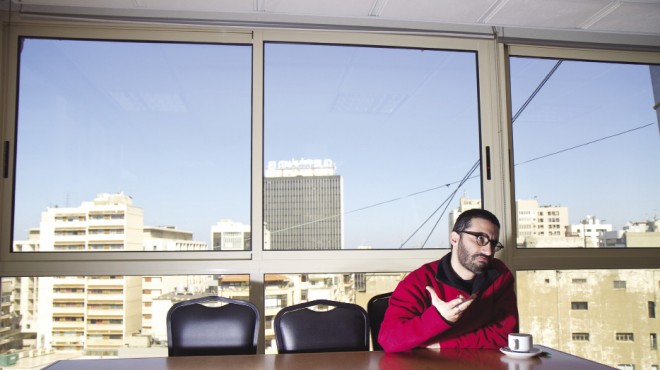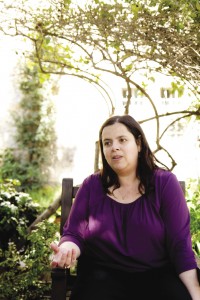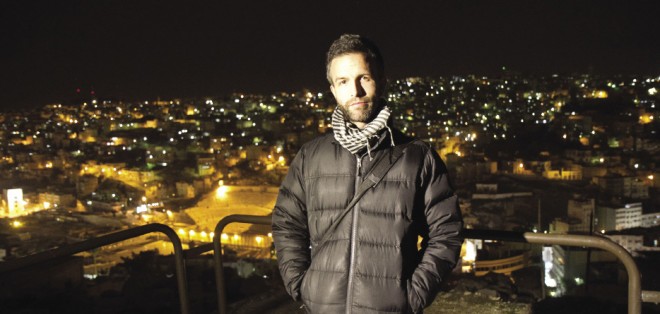
Arts should be cast in lead role
Raffi Feghali, SPI ’10
In one of the programs he uses in trainings, Raffi Feghali assigns each person in the room a simple, two-part task: (1) Find an object that can make noise; (2) use it to create a simple rhythm that carries some sort of personal meaning.
This accomplished, Feghali has each person perform his or her rhythm and explain its significance. Next, he pairs participants with one another, instructing them to coordinate their individual rhythms into a duet. Next they form quartets, octets, and eventually, the entire group gives a joint performance of their new rhythmic composition. Doing so requires negotiation, cooperation and compromise on everyone’s part.
“When they sit down to talk about how it came together, everything we learn about conflict transformation actually surfaces from this process,” says Feghali, who focused at SPI on using the arts for peacebuilding.
Originally trained as a computer scientist, Feghali eventually left that profession to pursue his passion for joining the arts with peacebuilding. He is now pursuing a master’s degree in expressive arts for conflict transformation and peacebuilding through the European Graduate School in Saas-Fee, Switzerland.
Feghali also runs an organization he founded called Live Lactic Culture, dedicated to promoting improvisational theater in Lebanon and applying its techniques to social activism. He discovered “improv” theater at a festival in Amsterdam several years ago and was immediately struck by the form’s potential for peace activism. One of his current focuses is working with Lebanon’s Syrian refugees, fleeing the ongoing civil war.
In improv, he notes, there exists a concept called “Yes … AND.” When one actor does something, the others immediately accept and build upon it to create a scene for the audience.
“Let’s bring ‘Yes … AND’ to life and see what happens,” Feghali says. “You’ll see lots of magic, just like the magic on stage.”
Furthermore, he is convinced that the arts are not simply one of many peacebuilding tools. The arts, he says, are the only way to truly transform conflict and build peace, by speaking to people on multiple levels and by establishing deeper connection to the youth who will be dealing with conflicts in the future.
“The arts talk at all levels with people – it’s intellectual, emotional, physical,” Feghali says. “Arts is not a tool. It’s the only way.”
Raffi Feghali will be co-teaching an arts and media-based peacebuilding course at SPI 2013.
Hearing each other’s stories
Carol Grosman, MA ’08

Personal stories, says Carol Grosman, MA ’08, have soft edges. They transcend the rigid opinions that entrench and exacerbate conflict in the Middle East. They present people with the opportunity to connect, to approach one another with empathy, to build understanding of those on “the other side” of an ideological chasm.
Grosman, a writer, storyteller and the director of the Jerusalem Stories project, relates a personal example from a storytelling lesson she taught at an Arab school in East Jerusalem. That day, she prompted students in the class to tell each other stories about cooking mishaps. As part of the lesson, Grosman told the class about how, soon after her parents’ wedding, her mother attempted to impress her father by frying a chicken. Unfortunately Grosman’s mother went to work in a kitchen set up by her new mother-in-law, and she mistook powdered soap for flour when breading the chicken. Afterwards, one of the students – who wore conservative Islamic dress and likely held many opinions different from Grosman’s American Jewish mother – announced that the same thing had happened to her.
“This is the place of human, personal stories,” says Grosman. “They take us to a whole different place where we can empathize, where we can both exist and where we can notice ‘the other.’”
Grosman founded the Jerusalem Stories project in 2002, when she began collecting stories from residents of Jerusalem about how they have been affected by conflict and what the city means to them. In collaboration with the photographer Lloyd Wolf, she has since organized exhibits, led workshops and staged performances that tell the personal stories of dozens of people who call Jerusalem home. The project’s goal is to promote empathy, increase communication, and spread a sense of shared humanity among Israelis and Palestinians who live in Jerusalem and help them deal with the conflicts that frequently divide them.
To reach a wider audience, Grosman is now working on a book and a film based on her Jerusalem Stories interviews. She describes her work as “powerful communication from a safe distance.” An example would be using a Palestinian actor to tell an Israeli story in Arabic to a Palestinian audience (or, vice-versa, an Israeli actor using Hebrew to tell a Israeli audience a Palestinian story). This technique, she says, can be a gentle way to reach groups of people who would be uncomfortable or unwilling to interact directly with “the other side.”
“Mutual recognition of each other’s needs, fears and histories will better prepare Israeli and Palestinian publics for a positively shared future,” wrote Grosman, in a description of the Jerusalem Stories project.
The work so far, she continues, has been “difficult, but very beautiful.”

Playback, despite murder and arrests
Ben Rivers, SPI ’10
Working with an arts and cultural center called The Freedom Theatre in the Palestinian city of Jenin, Ben Rivers (SPI ’10) uses a form of improvisational drama called “playback theater” as a tool for trauma response and conflict transformation.
During a playback theater performance, members of the audience are invited to share personal stories. After hearing each of these stories, the cast acts it out on stage. When used as a trauma-response tool – one of its primary purposes in Rivers’ work – playback theater allows people to relate, understand and process traumatic experiences as part of a larger community.
“The man who tells a story about torture is no longer alone with his memories and feelings of violation. Nor is he powerless in the way that he was,” Rivers wrote in a 2012 paper on the subject. “He chooses to enter the stage. He volunteers to tell. He casts the actors. He gives the final comment. The actors join him in a form of deep accompaniment. They are not only listening. They also embrace his subjective reality in an empathetic, embodied and artistic response.”
This art form also represents “a potent force against hegemony” – it serves to draw attention to the difficult realities of Palestinian life under Israeli occupation, says Rivers.
Playback theater also fills important advocacy and consciousness-raising roles, key early steps in transforming an asymmetrical conflict like that between Israelis and Palestinians, he continues. Many members of The Freedom Theatre have been arrested recently on insubstantial grounds, Rivers says, which he takes as evidence that its work undermines the Israeli occupation. (In April 2011, The Freedom Theatre’s half-Jewish, half-Palestinian co-founder, 52-year-old Juliano Mer-Khamis – a former Israeli paratrooper – was murdered by a masked gunman by the theater.)
As part of his work with The Freedom Theatre, Rivers is leading the Freedom Bus tour from September 23 to October 1, 2012. The tour includes Playback Theater events in 13 communities in the West Bank, as well as community visits, seminars led by Palestinian scholars and artists, and concerts. The initiative was inspired by the “Freedom Riders” who challenged racial segregation in the southern United States during the Civil Rights era.
Rivers says he benefitted from his experience at SPI by developing significant relationships and gained valuable opportunity for in-depth study of trauma and conflict transformation theory.